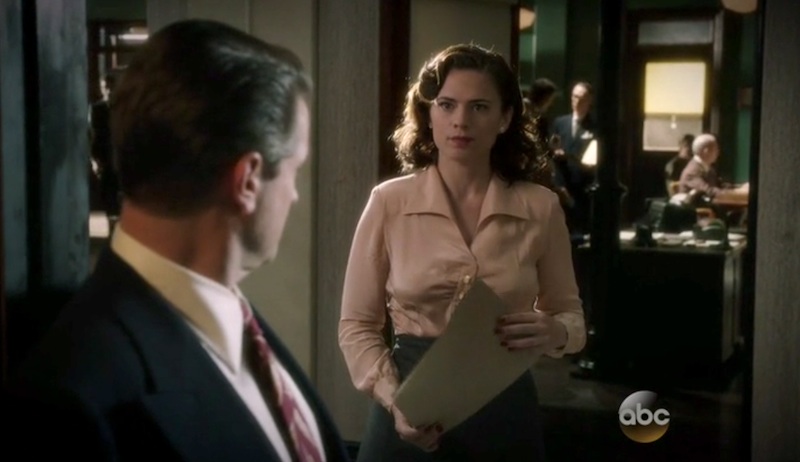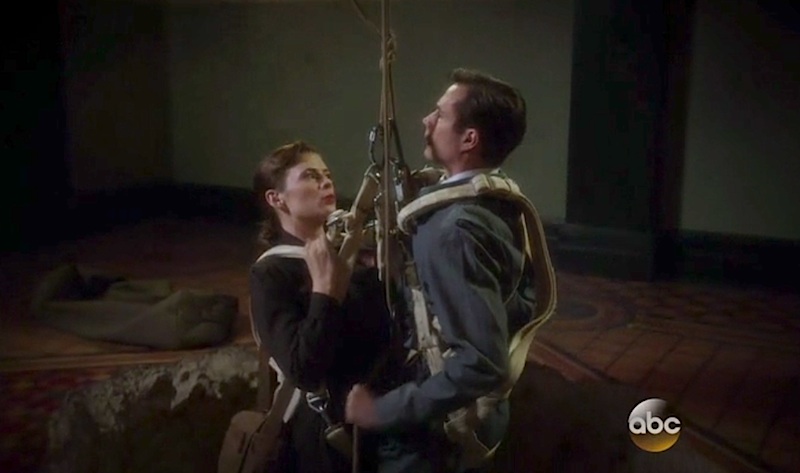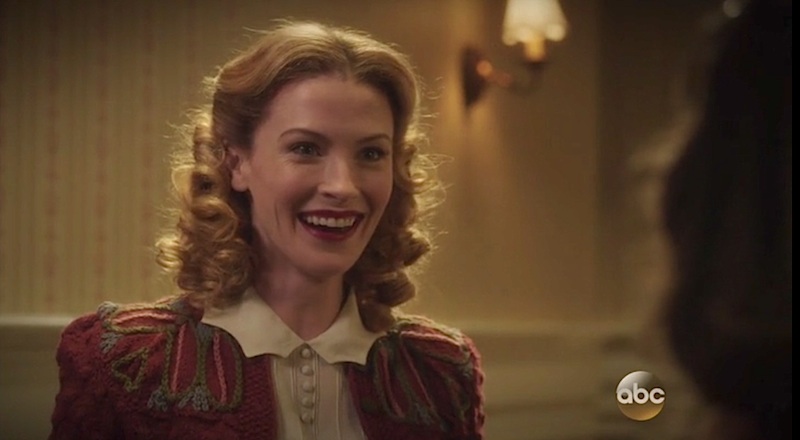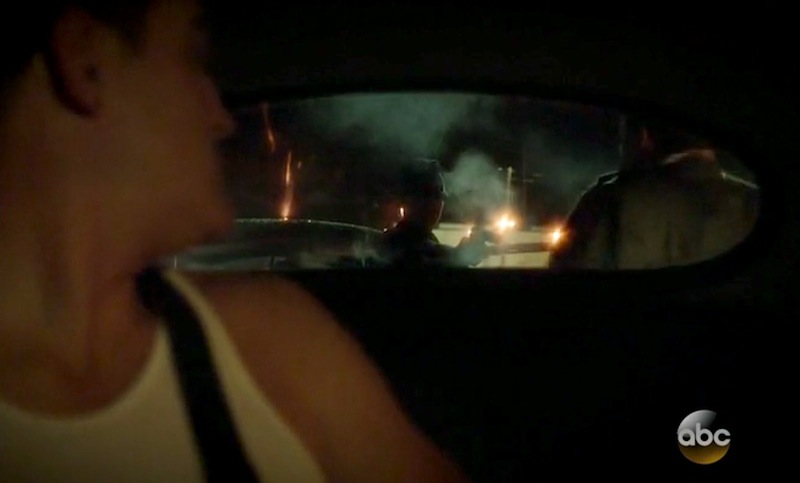Peggy Carter’s fellow agent Krzeminski is a loser. His outward slovenliness hides no buried treasure of wit or deductive acumen. You get the impression that Krzeminski was good once, perhaps before the war, because how else do you find yourself on the SSR? But not now. Now he’s a joke to his co-workers and a talentless grunt in the eyes of his boss. Even Peggy, the agreed-upon office outcast, just ignores him.
Peggy Carter’s fellow sleuth Jarvis is a winner. His impeccable visage supports a sharp tongue and a noble heart. His capability is so honed and selfless that it saves lives, his wife’s paramount among them. When the SSR interrogates him in “Time and Tide” they don’t lay a finger on him, and he eventually declares their questioning over and strides confidently out of the room. Peggy, our agreed-upon protagonist, comes to find the same heroism in Jarvis that she saw in Captain America.
So why is it Krzeminski that I’m thinking about after the end of the latest episode of Agent Carter?
This show came out of the gate so strongly with its first two episodes that a slow-down seemed inevitable for this week’s episode, the third of eight total. A show can’t be all high-octane adventure, after all, or it becomes flat and without contrast. While this week’s Agent Carter was definitely a breather of sorts, it wasn’t at all the kind of ignorable eye-resting episode that one expects after a rock-’em sock-’em show premiere. The show, in fact, uses that expectation against you in the very end, making you feel guilty for being so dismissive of its quieter moments, thereby instilling within the viewer the same guilt that Peggy feels for her fellow agent at the end of “Time and Tide.”
The episode itself isn’t really paying attention to Agent Krzeminski, though. Most of its quiet and most powerful moments belong to Jarvis, whose quality finally stands revealed to a skeptical Peggy in this episode. The SSR doesn’t take long at all to connect him to the Roxxon implosion and to get him manuevered behind closed doors. At first Jarvis spins around their questions with an effete grace. All he’s missing is a cup of tea to complete the illusion.
Then the mystery of Mrs. Jarvis comes into play and it is far less of a joke than I imagined it might be in my recap of the first two episodes. “I am not always forthright [with my wife], but I am always honest,” Jarvis tells Peggy later on in the episode, and it’s fascinating, because Jarvis would never have been prompted to say that unless his loyalty was being called into question. This is the corner that the SSR thinks they’ve backed Jarvis into. You’re legally a capital-T traitor, they claim, and they’re right. But for an organization whose purpose it is to look beyond the surface, they’re all too willing to take this supposition at face value.
This is where the SSR fails and this is a precise example of why Peggy will succeed. But first, Peggy needs to take a leap of faith. Her employer’s files prove Jarvis’ status as a traitor to his country but that doesn’t fit with the Jarvis she knows, or rather, it doesn’t fit with the Jarvis that she hopes is the Jarvis she knows. As we’ve seen over and over, what Peggy chooses to put her faith and trust in tends to fail her. What if springing Jarvis from the SSR interrogation room is a mistake? What if he fails her?
It’s a fascinating internal struggle to behold. Peggy’s experiences tell her that Jarvis could turn out to not be worth the risk she’s taking in setting him free, but ultimately she ignores these external experiences in favor of her internal intuition; her gut feeling. Freeing Jarvis boils down to a question Peggy must ask of herself: does she believe what she intuits to be true, or does she believe what the world imposes upon her?
Believing in Jarvis’ nobility becomes about believing in her own capability, and thus does she make the most thrilling filing error in the history of filing errors.

Her faith pays off, not only for their mission and not only for her own confidence, but for Jarvis’ sense of identity, as well. Although Peggy can take a leap of faith in freeing him from the clutches of her fellow agents, she can’t bring herself to totally ignore what she knows about Jarvis’ status as a traitor. Funnily enough, it’s this clear admission of Peggy’s limited loyalty towards Jarvis that reinforces Jarvis’ loyalty towards Peggy and this is a massively important step for his character. Jarvis is a Hufflepuff through and through, loyal to his wife, loyal to Stark, and now, upon seeing Peggy’s reaction to the truth behind his status as a traitor, loyal to Peggy. And as we’ve seen, winning the loyalty of Jarvis is pretty important for one’s survival in the Marvel universe.
It also makes messing with Jarvis’ sensibilities a lot more fun. Some semblance of privacy must be maintained, please!

The continuing BFF-ing of Jarvis and Peggy is also helfpul to the plot, along with being terrifically fun to watch. Together, the two of them suss out where Stark’s vault stuff went and reclaim it from a Coney Island bruiser assumably hired by Leviathan to guard it until…well, that’s not yet clear. Assumably until Leviathan can borrow its cousin’s ZipCar account for the weekend.
Jarvis phones the SSR as Brooklyn Jarvis so they can come pick the stuff up and they can be the ones who profit from Peggy’s hard work and clear Howard Stark’s name. Jarvis’ logic hurts here, and Peggy knows it. It sucks that she wouldn’t be believed if she showed up with the vault treasures, despite having done all the work, but there’s a greater good in play. (Isn’t there always?) Jarvis’ loyalty to Stark’s life trumps his loyalty to Peggy’s capability.
Peggy, and the audience, are so focused on the positive outcomes of the recovery of Stark’s tech that we don’t think about the consequences. Neither does Agent Krzeminski, who isn’t even trusted with transporting the tech itself, just the Coney Island bruiser. The bruiser is an afterthought in this whole scheme, only brought along because he might have some info on him. We shouldn’t even be seeing this scene, really. It’s an afterthought itself, an in-between space that gives the viewer an opportunity to get up and get a snack, or refresh their email. Even to Krzeminski it’s an opportunity to loosen his tie and assert the power and authority that no one else will grant him.
He’s in element, such as it is, when he’s wordlessly and brutally murdered.
Something I wasn’t expecting from Agent Carter was how vicious its depiction of violence was going to be in comparison to Agents of S.H.I.E.L.D. The body count on S.H.I.E.L.D. is far more massive than Agent Carter’s, but you don’t feel those deaths the way that you do Colleen’s from the last episode or Krzeminski’s from this episode. Some of it is the way the violence is staged. The fights here have a real weight and force to them that even something as cool as Agent May fighting her twin can’t quite muster. Some of it is the post-war setting. Agent Carter doesn’t let you forget that for these characters the horrors of World War 2 are only as old as the iPhone 5 is for us. Any death and violence that occurs in this setting feels acutely wasteful and ghoulish. Wasn’t a world war enough for these Leviathan monsters?
But mostly the heightened impacts of these deaths are because they’re all consequences of Peggy’s actions. Krzeminski’s death is a painful reminder that this fight will consume her life, even those whom she doesn’t respect. It’s one thing to lose an innocent like Colleen, it’s another to lose Agent Krzeminski. Was it his fault? He was sloppy and negligent. Maybe he wasn’t paying attention. Maybe that’s why he died….
Those are all excuses. Krzeminski’s sloppiness didn’t mean he deserved to die. That’s only a justification hurriedly erected to mask Peggy’s fear, and it’s obvious in her final scene with Angie. What she is doing, what she is hiding, will result in deaths. Even for those, especially for those, whom she feels no loyalty towards.
Thoughts:
- We’re on to you, Dottie!

Chris Lough covers Agent Carter and Agents of S.H.I.E.L.D. on Tor.com. He wonders if Peggy Carter and Jarvis realize that the other is British.










